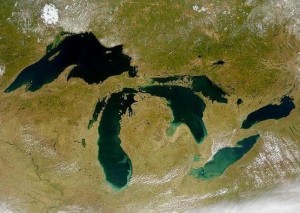
Mercury is the new threat to the clean up of the Great Lakes. It has been reported by a compilation of 170 researchers’ work just how mercury affects the Great Lakes region – the Canadian state Ontario and eight US states. Problems that stem from ingesting methyl mercury include cardiovascular disease. Fish is the most common source.
For the last 200 years the Lakes have been polluted by burning fossil fuels, incinerating waste, smelting metal, producing chlorine, mining and discharging mercury. The authorities have done all they could over the last 40 years to stop the mercury pollution. Charles Driscoll, University Professor of Environmental Systems Engineering at Syracuse University NY, explained, “We documented a 20% decline in sediment mercury deposition from peak values around 1985. This decline was concurrent with a 48 percent decline in mercury emissions from sources in the Great Lakes region and a 17 percent increase in global emissions.” Recently, atmospheric mercury has continued to flow in fresh water through the methyl mercury path and has contaminated about six fish species and some bird species.
These fish species were also game spp. such as trout, walleye, bass, pike and muskellunge. Loons are also among the birds with increased mercury content. They are also useful for studying the effects of mercury. These studies have established a clear relation between exposure to methyl mercury and reproduction in adult loons. Developing embryos are sensitive to it, especially if they’re in eggs. This way mercury can cause population-level impacts.
Atmospheric pollution should definitely be lowered, there’s no question about it. That way we can address the problem of mercury contamination in fresh water and their impact on the environment. The reasons for the increase of mercury are related to other factors affecting these areas. The northern and north-eastern parts have a high dry deposition of mercury and other watershed features, which can produce methyl mercury. The fish in these parts are more contaminated with mercury.
Even at the moment researchers are doing their best to determine the reasons for mercury ingress and how to stop it.
Is it possible that the clean up of such an imposing body of water and will it then give hope for fixing both fresh water and oceans alike?
